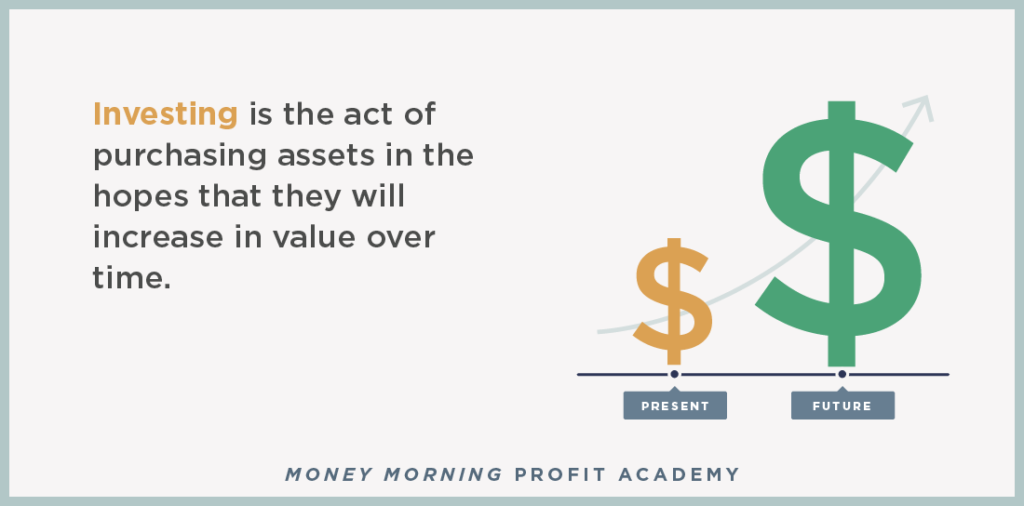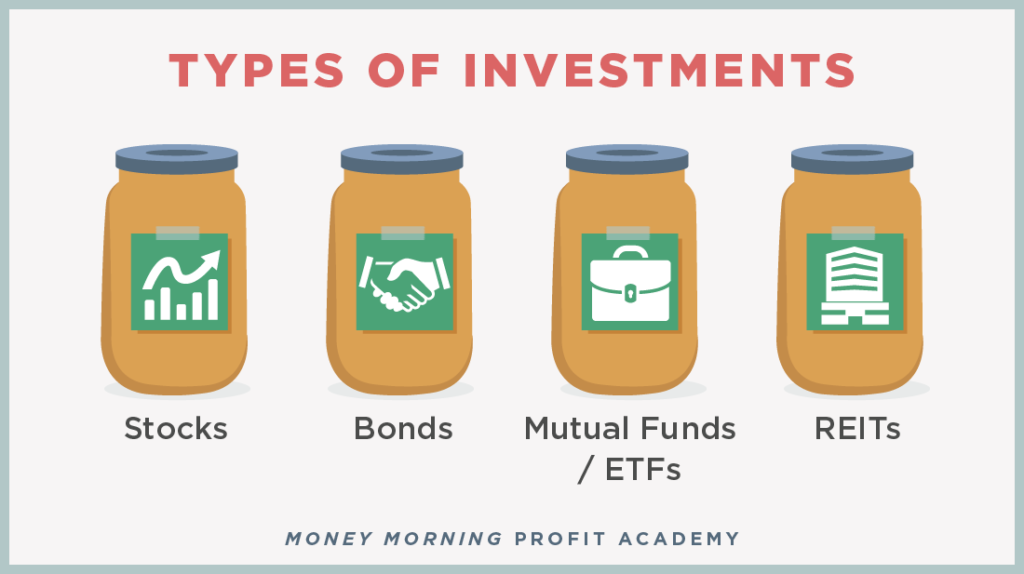
Many people find the idea of investing intimidating.
Between never-ending financial jargon and the 24/7 stream of news to keep up with, investing may seem like something every-day Americans don’t have access to. But that couldn’t be further from the truth.
By starting with the basics, like what investing is, you’ll be on your way to achieving those financial goals.
So, what does it really mean to invest?
Investing is simply about putting your money to work for you. In other words, people who invest money often purchase assets that they believe will gain value over time, thus earning them more money.

While the investing process gets more nuanced as you learn, the overarching goal of investing is to put your money into an asset that will return more money to you over time.
But there’s plenty more to cover in terms of investments.
Learning how investments become profitable and the most common types of investments you may encounter, are crucial to mastering the art of investing.
Get started with our investing course to gain a working knowledge of what investing is, how it works, common types of investments, and more.
How Does Investing Work?
There are endless assets to consider investing in.
For example, investments can range from starting your own business to buying a new home or even purchasing gold jewelry. Some people even invest in wine or art. The options are endless.
If your investments result in additional income (like the profits from owning a business) or grow in value over time (such as your house appreciating), then those can be considered investing your money.
But just as investments can make you money, investing can have risks (potential of losing money) depending on the choices you make or the ebbs and flows of the market.
More specifically, some investments are riskier than others.
Taking your life savings to start a business could end with you losing it all if the business does poorly. But others may weigh the possibility of starting a new, successful business as more important than the risks associated with it.
As you begin to plan your investments and goals, be aware of how much risk you’re comfortable with. Ask yourself whether you’re prepared to lose big on a certain stock and what your safety net looks like should your investments fall through.
While staying vigilant is a great way to ensure your investment decisions are profitable, there is always a level of risk present that you need to be aware of.
All investing comes with some level of risk, which is part of what differentiates it from simply saving your money over time.
Active vs. Passive Investing
Once you understand the risks and rewards of investing, you can choose the type of investment method you prefer, which boils down to active vs. passive investing.
With passive investing, investors take more time to let the market play out naturally. It’s often appealing because there is less hands-on managing that investors need to do.
Active investing requires a more involved role. With active investing, you make preemptive decisions about your stocks before the market adjusts on its own, which may require more research and knowledge about various types of investments and how they’re performing so you can make wise, timely decisions.
There is no one right answer for how to invest, but knowing your level of commitment to the process, risk tolerance, and financial goals can help you decide whether you’re a more passive or active investor.
Common Types of Investments
To fully understand what investing is, begin to familiarize yourself with some of the most common types of investments.
Some investments may be better suited for your style and goals than others, but it’s worth getting to know the basics of each to help you decide which investments to start with.

To begin, consider stocks, bonds, mutual funds and ETFs, and REITs.
Stocks
One of the most popular ways to invest is by purchasing stocks in publicly traded companies.
Stocks can offer some of the most positive gains amongst types of investments and they allow you to invest only what you’re comfortable with.
When you buy a company’s stock, you’re purchasing a share in the company and essentially becoming a stakeholder or partial owner of the business.
Depending on how many shares you own for a specific company, you may be included in important business decisions.
Bonds
A bond is a loan that a buyer pays to a business or government with the understanding that the bond amount will be paid back by a certain date plus interest.
Although bonds are typically considered a safer form of investment than stocks, they can still involve a small level of risk. Still, many investors incorporate at least a small number of bonds into their portfolio to help diversify their assets and negate unfavorable changes to the stock market.
Mutual Funds and ETFs
If you’re particularly interested in diversifying your assets quickly, mutual funds and exchange-traded funds (ETFs) may be a good option.
Diversifying your portfolio involves investing in different types of assets to help safeguard against sudden losses in one particular asset. It can be an effective form of long-term risk management when you’re investing.
Unlike investing in individual stocks, mutual funds and ETFs can hold multiple investments in different companies. A single fund may hold numerous stocks, allowing you to easily diversify your stock portfolio.
They may also save you time since you don’t have to research individual stocks.
If you’re interested in these types of funds, it’s helpful to hire a professional to aid in managing your assets. Mutual funds and ETFs are typically actively managed investments, and it’s worth getting assistance to make the best decisions to meet your financial goals.
REITs
One additional asset that investors often use to diversify their portfolio is real estate investment trusts, or REITs.
Unlike investing in a new house or land, REITs provide investors with the option to purchase shares in a real estate-focused business rather than managing a building, factory, or hotel directly.
Compared to stocks, REITs often pay investors higher dividends and may involve less overall risk.
Like mutual funds and ETFs, REITs are a great option for diversifying your portfolio rather than focusing on one type of investment.
Beginning to Invest
To invest, you only need a willingness to learn and a desire to grow your money. As you gain practical knowledge about investing, you’ll have the tools you need to build out your portfolio.
And, with Money Morning's Profit Academy in your back pocket, you can start making investment decisions like a seasoned pro.


